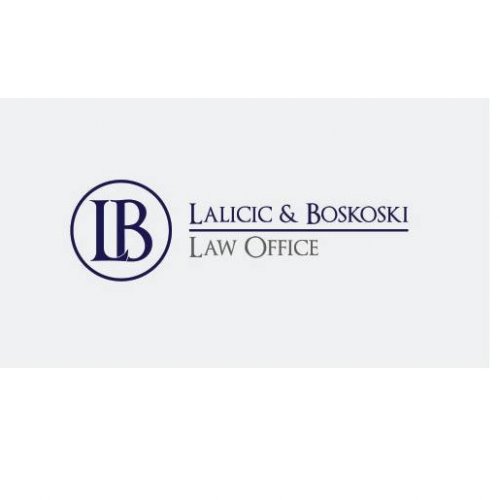Best Tax Increment Financing Lawyers in Skopje
Share your needs with us, get contacted by law firms.
Free. Takes 2 min.
List of the best lawyers in Skopje, North Macedonia
About Tax Increment Financing Law in Skopje, North Macedonia
Tax Increment Financing (TIF) is a public financing method used to support community and economic development initiatives in Skopje, North Macedonia. The basic premise of TIF involves utilizing the incremental tax revenue generated from increased property values as a source of funding for public infrastructure improvements and community assets. It's a tool aimed at stimulating private investment in underdeveloped areas by leveraging future tax gains to finance current improvements. This method supports urban renewal projects and helps revitalize areas that may otherwise remain underdeveloped.
Why You May Need a Lawyer
Engaging with TIF can be complex, and there are several scenarios where legal assistance might be necessary:
- Understanding the Complexity: TIF involves multiple agreements, statutes, and potentially complex financial arrangements that necessitate expert legal interpretation.
- Contract Negotiations: Developers, businesses, and municipalities might need help negotiating terms that are favorable and compliant with local regulations.
- Compliance and Regulatory Issues: Ensuring compliance with local laws governing TIF, including project eligibility and reporting requirements, is crucial.
- Dispute Resolution: Legal conflicts can arise between stakeholders regarding the implementation and benefits distribution of a TIF project.
Local Laws Overview
The legal framework for TIF in Skopje, North Macedonia, involves several key aspects:
- Eligibility of Projects: Not all projects qualify for TIF. Local laws specify the types of development initiatives that can be supported.
- Public-Private Partnerships: TIF often involves collaboration between government bodies and the private sector, necessitating clear legal agreements.
- Redevelopment Zones: Specific areas may be designated as eligible for TIF to encourage investment in underdeveloped regions.
- Future Tax Increments: Clarity on how incremental tax revenues are calculated and utilized to finance redevelopment projects.
Frequently Asked Questions
What is the primary purpose of Tax Increment Financing?
TIF is used primarily to stimulate economic development and revitalization in underdeveloped or blighted areas by funding infrastructure improvements with future anticipated tax revenues.
How does TIF benefit the community?
TIF can help fund critical infrastructure, enhance property values, create jobs, and stimulate economic growth, leading to a more vibrant and sustainable community.
Are there risks involved with TIF?
Yes, risks include potential overestimation of future tax revenues, leading to funding shortfalls, and disputes over project impacts and revenue distribution.
Can any development project qualify for TIF?
No, projects must meet certain criteria defined by local laws, which typically focus on public benefit and addressing areas with demonstrated need for infrastructure improvements.
Who decides on the allocation of TIF funds?
Local government authorities, often in consultation with developers and community stakeholders, decide on the allocation of TIF funds based on project applications and qualifications.
What role do local governments play in TIF?
Local governments initiate TIF districts, negotiate agreements with developers, and oversee project implementation, compliance, and fiscal management.
How can TIF impact property taxes?
TIF can result in higher property taxes due to increased property valuations; however, the incremental tax increases are often invested back into the community.
Is there a typical duration for TIF agreements?
The duration can vary significantly, but TIF agreements often span 15-25 years to allow time for project completion and tax increment realization.
How is TIF funding repaid?
TIF is repaid through the additional tax revenues generated by the increase in property value within the TIF district.
How can a legal expert assist with TIF?
A lawyer can provide crucial insights into TIF laws, assist with contract negotiations, ensure compliance, and help resolve disputes between stakeholders.
Additional Resources
For further assistance regarding TIF in Skopje, North Macedonia, consider reaching out to the following resources:
- The Ministry of Finance of North Macedonia for guidelines and regulatory information.
- Local economic development offices for details on eligible projects and application processes.
- Professional organizations specializing in urban planning and redevelopment for expert advice and best practices.
Next Steps
If you require legal assistance with TIF in Skopje, the following steps can help you move forward:
- Consult a Lawyer: Seek a consultation with a legal expert specializing in TIF and urban development law to discuss your specific needs.
- Prepare Documentation: Gather relevant documents regarding your development project to assist in initial consultations and assessments.
- Evaluate Legal Firms: Research and evaluate law firms with experience in TIF to ensure you choose a provider who understands the nuances of local laws and regulations.
- Engage with Local Authorities: Communicate with local authorities overseeing TIF to understand any current policies, restrictions, or opportunities available for your project.
Lawzana helps you find the best lawyers and law firms in Skopje through a curated and pre-screened list of qualified legal professionals. Our platform offers rankings and detailed profiles of attorneys and law firms, allowing you to compare based on practice areas, including Tax Increment Financing, experience, and client feedback.
Each profile includes a description of the firm's areas of practice, client reviews, team members and partners, year of establishment, spoken languages, office locations, contact information, social media presence, and any published articles or resources. Most firms on our platform speak English and are experienced in both local and international legal matters.
Get a quote from top-rated law firms in Skopje, North Macedonia — quickly, securely, and without unnecessary hassle.
Disclaimer:
The information provided on this page is for general informational purposes only and does not constitute legal advice. While we strive to ensure the accuracy and relevance of the content, legal information may change over time, and interpretations of the law can vary. You should always consult with a qualified legal professional for advice specific to your situation.
We disclaim all liability for actions taken or not taken based on the content of this page. If you believe any information is incorrect or outdated, please contact us, and we will review and update it where appropriate.
















